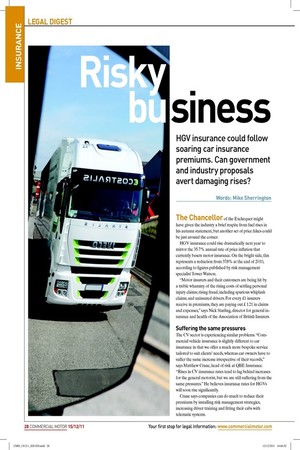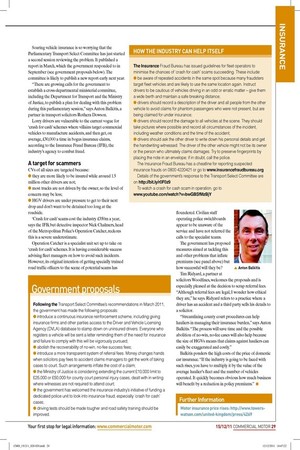Risky business
Page 23

Page 24

If you've noticed an error in this article please click here to report it so we can fix it.
HGV insurance could follow soaring car insurance premiums. Can government and industry proposals avert damaging rises?
Words: Mike Sherrington The Chancellor of the Exchequer might have given the industry a brief respite from fuel rises in his autumn statement, but another set of price hikes could be just around the corner.
HGV insurance could rise dramatically next year to mirror the 35.7% annual rate of price inlation that currently besets motor insurance. On the bright side, this represents a reduction from 37.8% at the end of 2010, according to igures published by risk management specialist Tower Watson.
“Motor insurers and their customers are being hit by a treble whammy of the rising costs of settling personal injury claims; rising fraud, including spurious whiplash claims; and uninsured drivers. For every £1 insurers receive in premiums, they are paying out £ 1.21 in claims and expenses,” says Nick Starling, director for general insurance and health of the Association of British Insurers.
Suffering the same pressures
The CV sector is experiencing similar problems. “Commercial vehicle insurance is slightly different to car insurance in that we offer a much more bespoke service tailored to suit clients’ needs, whereas car owners have to suffer the same increase irrespective of their records,” says Matthew Crane, head of risk at QBE Insurance. “Rises in CV insurance rates tend to lag behind increases for the general motorist, but we are still suffering from the same pressures.” He believes insurance rates for HGVs will soon rise signiicantly.
Crane says companies can do much to reduce their premiums by installing risk management strategies, increasing driver training and itting their cabs with telematic systems. Soaring vehicle insurance is so worrying that the Parliamentary Transport Select Committee has just started a second session reviewing the problem. It published a report in March, which the government responded to in September (see government proposals below). The committee is likely to publish a new report early next year.
“There are growing calls for the government to establish a cross-departmental ministerial committee, including the Department for Transport and the Ministry of Justice, to publish a plan for dealing with this problem during this parliamentary session,” says Anton Balkitis, a partner in transport solicitors Rothera Dowson.
Lorry drivers are vulnerable to the current vogue for ‘crash for cash’ schemes where villains target commercial vehicles to manufacture accidents, and then get, on average, £30,000 a time in bogus insurance claims, according to the Insurance Fraud Bureau (IFB), the industry’s agency to combat fraud.
A target for scammers
CVs of all sizes are targeted because: ● they are more likely to be insured while around 1.5 million other drivers are not; ● most trucks are not driven by the owner, so the level of concern may be less; ● HGV drivers are under pressure to get to their next drop and don’t want to be detained too long at the roadside.
‘Crash for cash’ scams cost the industry £350m a year, says the IFB, but detective inspector Nick Chalmers, head of the Metropolitan Police’s Operation Catcher, reckons this is a severe underestimate.
Operation Catcher is a specialist unit set up to take on ‘crash for cash’ schemes. It is having considerable success advising leet managers on how to avoid such incidents. However, its original intention of getting specially trained road trafic oficers to the scene of potential scams has loundered. Civilian staff operating police switchboards appear to be unaware of the service and have not referred the calls to the specialist teams.
The government has proposed measures aimed at tackling this and other problems that inlate premiums (see panel above) but how successful will they be?
Tim Ridyard, a partner at solicitors Woodines, welcomes the proposals and is especially pleased at the decision to scrap referral fees. “Although referral fees are legal, I wonder how ethical they are,” he says. Ridyard refers to a practice where a driver has an accident and a third party sells his details to a solicitor.
“Streamlining county court procedures can help hauliers in managing their insurance burden,” says Anton Balkitis. “The process will save time and the possible abolition of no-win, no-fee cases will also help because the size of HGVs means that claims against hauliers can easily be exaggerated and costly.”
Balkitis ponders the high costs of the price of domestic car insurance. “If the industry is going to be faced with such rises, you have to multiply it by the value of the average haulier’s leet and the number of vehicles operated. It quickly becomes obvious how much business will beneit by a reduction in policy premiums.” ■
Further Information
Motor insurance price rises: http://www.towerswatson.com/united-kingdom/press/4269



















































